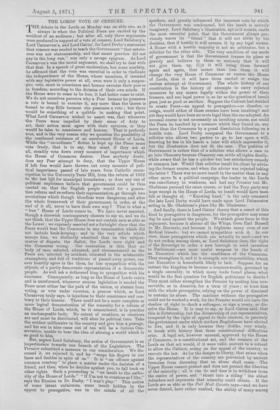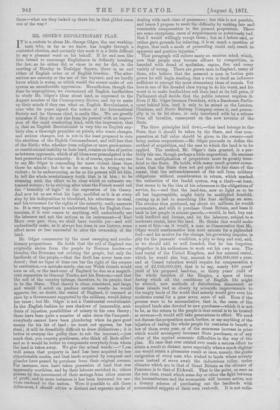THE LORDS' VOTE OF CENSURE.
THE debate in the Lords on Monday was an able one, as it always is when the Political Peers are excited by the accident of an audience ; but after all, only three arguments were produced in support of a vote of censure, Lord Salisbury's, Lord Carnarvon'e, and Lord Cairns', for Lord Derby's statement that censure was needed to teach the Government "that astute- ness was not statesmanship, and that smart practice did not pay in the long run," was only a savage epigram. As Lord Carnarvon's was the moral argument, we shall try to deal with -that first. In a speech of great moderation, but some acerbity, be affirmed that the vote was essential in order to vindicate the independence of the House, whose members, if invested with any legislative power at all, even were it only a suspen- sive veto, must in conscience and honour exercise their pow er in freedom, according to the dictates of their own minds. If -the House were to cease to be free, it had better cease to exist. We do not ourselves perceive why a Peer because he possesses a vote is bound to exercise it, any more than the Queen is 'bound to stop Bills because she possesses a veto ; but there -would be something of a quibble in making that point. What Lord Carnarvon wished to assert was, that whenever the Peers were impelled by their sense of duty to act, their action must agree with their opinions, or they would be false to conscience and honour. That is perfectly true, and is the very reason why we question the possibility of the continued existence of an unreformed House of Lords. While the "co-ordinate " fiction is kept up the Peers must vote freely, that is to say, they must, if they act at all, steadily vote down every measure of importance which the House of Commons desires. Does anybody doubt, does any Peer attempt to deny, that the Upper House if loft free would have thrown, out every measure of poli- tical importance passed of late years, from Catholic eman- cipation to the University Tests' Bill, from the reform of 1832 'to the last bill for municipal boundaries ; or does any one of political experience believe that government could be thus carried on, that the English people would for a genera- tion reform and re-reform their representation, go through two revolutions which though bloodless were dangerous, and alter the whole framework of their government, in order, at the End of it all, never to have their own way ? That is what a "free " House of Lords comes to. We have never asserted, though a shrewish contemporary chooses to say so, and we do not think, that the Upper House does not contain men as able as the Lower ; we expressly asserted not a fortnight since that the Peers would beat the Commons in any examination which did -not include book-keeping ; and in the very article which annoys him, NVO distinctly admitted that on the subject- matter of dispute, the Ballot, the Lords were right and the Commons wrong. Our contention is this, that no body of men selected, educated, and circumstanced as the Peers are, selected by accident, educated in the aristocratic atmosphere, and full of traditions of passed-away power, can ever heartily agree in the ideas, far less sympathize with the objects, of a partly democratic representation of a democratic people. As well ask a dethroned king to sympathise with his 'successor. Consequently, as long as the House of Lords exists and is unreformed, whenever serious legislation is needed the -Peers must either bar the path of the nation, or abstain from -voting, or vote under coercion, a process which, as Lord 'Clarnarvon truly says, is injurious to their conscience and con- trary to their honour. There could not be a more complete or more logical demonstration of the necessity for a reform of the House of Lords, which, be it remembered, is in practice an unchangeable body. No extent of creations, as creations are and must be distributed, will alter its political tone. Take the reddest millionaire in the country and give him a peerage, and his son in nine cases out of ten will be a furious Con- servative, unable to bear the idea of altering a world which is .so good to him.
But, argues Lord Salisbury, the action of Government is an impertinence towards one branch of the Legislature. The Premier submitted a measure to our consideration. We dis- cussed it, we rejected it, and he "snaps his fingers in our faces and decides in spite of us." It is "an offence against common courtesy" to place a matter under the decision of a friend, and then, when he decides against you, to fall back on other rights. Such a proceeding is "an insult to the autho- rity of the House of Lords." "If I'm not to construe as I like," says the Etonian to Dr. Busby, "I won't play." This notion of some latent unfairness, some insult hidden in the appeal to prerogative, was in the minds of all the speakers, and greatly influenced the immense vote by which the Government was condemned, but the insult is entirely imaginary. Lord Salisbury's illustration, apt as it sounds, omits the most essential point, that the Government always pre- viously warns its " friend " that it will not abide by his decision, that if hostile it will reverse it by any legal means. A House with a hostile majority is not an arbitrator, but a solicitor for the other side. The very condition of our mode of government is that the Government frames its plans so gravely and. believes in them so seriously that it will not give them up, t. b it will bring them forward again and again, that sooner than lose them it will change the very House of Commons or coerce the House of Lords, that it will have them carried or resign the useless attempt at Government. The whole history of our constitution is the history of attempts to carry rejected measures by any means legally within the power of their framers, and one legal power is, so far as the question of insult goes, just as good as another. Suppose the Cabinet had decided to create Peers—an appeal to prerogative—or dissolve, or resign, would either of those courses have been insulting? and yet they would have been no more legal than the one adopted. An unusual course is not necessarily an insulting course, nor could the Peers be insulted by a measure which they forced on, any more than the Commons by a penal dissolution following on a hostile vote. Lord Derby compared the Government to a solicitor who allows two parties to go to law upon a will, knowing he has in his hands a later will which supersedes it, but the illustration does not fit the case. The position of Government is rather that of a solicitor who allows a case to go into Chancery because Chancery can settle all rights finally, while aware that he has a quicker but less satisfactory remedy at common law. Would that solicitor insult his client by advis- ing the former course, and when the advice was rejected taking the latter ? There was no more insult in the matter than in any other move in a political campaign, the leader in the Lords was conciliatory to weakness, and had any Premier but Mr. Gladstone pursued the same course, or had the Tory party any hope except in the House of Lords, no insult would have been felt or thought of. "Knowing hand," is the only comment the late Lord Derby would have made upon Lord Paluaerston acting in Mr. Gladstone's place like Mr. Gladstone. And finally, there is Lord Cairns' theory that a resort of this kind to prerogative is dangerous, for the prerogative may some day be used against the people. We attach great force to this argument, because it alarms all the Whigs, from Earl Russell to Mr. Bouverie, and because it frightens many even of our Redical friends ; but we cannot sympathize with it. In our view, those prerogatives which can actually be used—and we do not reckon among these, as Lord Salisbury does, the right of the Sovereign to order a new borough to send members to Parliament—are most useful weapons in the hands of an Executive which has the confidence of the Commons. They strengthen it, and it is strength, not responsibility, which our Executive is henceforth likely to lack. Suppose for an instant the kingdom to become a commonwealth, governed by a single assembly, in which many lords found places, what would be the first question for English politicians to decide ? They must either strengthen the Premier by making him irre- movable, as in America, for a term of years ; or trust him with the whole prerogative, relying on the power of dismissal to restrain its abuse. The machine without the prerogative could not be worked a week, for the Premier would not have the shadow of, right to check a colleague, or sign a treaty, or dis- solve the House. It is easy to say, as Lord Cairns said, that this is dictatorship, but the dictatorship of our representatives, tempered by the right of appeal to their electors, is precisely the gov'ernment under which modern Englishmen have elected to live, and it is only because they dislike, very wisely, to break with history that these constitutional difficulties arise. A legal act, however unusual, approved by the House of Commons, is a constitutional act, and the censure of the Lords on that act would, if it were valid, amount to a refusal to allow the Cabinet, acting on the appeal of the country, to execute the law. As for the danger to liberty, that arises when the representatives of the country are prevented by ancient formulas from decreeing that an abuse shall cease. The Upper House cannot protect and does not protect the liberties of the minority ; all it can do and does is to withdraw from the centre of power, and "shunt into a siding " the ablest defenders and exponents that minority could obtain. If the Lords are as able as the Pall Mall Gazette says—and we have never denied, have rather exalted, the ability of many among them—what are they locked up there for, in that gilded room out of the way f

































 Previous page
Previous page